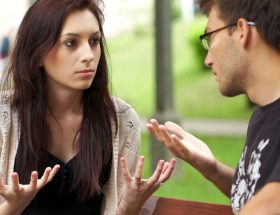Unrequited love is a common, yet painful part of life. A recent study of college and high school students discovered developing unreturned romantic feelings was four times more common than shared love. The pain is so profound from this style of love, the hurt often lasts far longer than from a breakup. In fact, study show this rejection creates brain activity that is commonly produced by physical pain.
The pain of unrequited love is taken to an even higher level when you fall for one of your friends. You can’t share your experiences with this person, which amplifies your hurt. However, if you want to continue your friendship through this obstacle, know that it is possible to overcome this challenge and emerge with an even stronger bond. You must make sure you remain honest with your feelings and be truthful when you say your friendship is the highest relationship priority. If you have any intention of deception or manipulation it will cause even more pain for the both of you.
Understanding why we fall in love with friends
Its common that people develop feelings for friends. Any healthy romance should have a basis of friendship first, to create the foundation for true intimacy.
- Foundation for love: To survive the difficult times, it is important that lovers are also friends. Because of the importance of friendships in romance, it can alter a viewpoint of seeing dear friends as potential life partner.
- Closeness: As people grow their bond, it can make their connection feel essential and something a person can’t live without.
- Similarities: Connections grow because of commonalities between people. When people share interests and hobbies it can make them seem like ideal romantic partners.
- Conflicting messages: Be careful of humor used in friendships. When people make flirtatious jokes, physical advances or other mixed signals, it can make one friend think there is reciprocal affection and the potential for love.
- Attachment style: A 1998 study determined those with anxious or ambivalent attachment style are predisposed to developed one-sided feelings. These attachment styles are rooted in unstable childhood dynamics. If one’s primary caregiver was erratic with affection or delivering your needs, they may grow up repeating this pattern into adulthood such as developing feelings for emotionally unavailable people.
Sustaining friendship after one-sided love
After you friend says they don’t return your romantic feelings you can still repair your bond. First, you must process your sadness and rejection. Your feelings are valid and normal. It’s important to grieve and discuss your feelings with another loved one. So long as your crush didn’t lead you on, they were merely being honest with their feels as you were with yours. It is not their fault they see you platonically just as its not your fault for envisioning romance.
When you have done sufficient processing, find a safe space to chart your future forward with your friend. Begin by addressing the awkwardness in the room. Again, release this isn’t anyone’s fault and commit to remaining friends. Discuss both of your needs to recover from this situation. Acknowledge any jealousy that might be lingering or could arise in the future. Agree to new boundaries to establish appropriate personal space. Remember, your friend needs to work through this situation as much as you do. They may feel emotions like sadness, shame, or anxiety as well as question how to avoid hurting you further.
Time will heal your wounds. You may need a few days before you send a low-key text keeping your door open. Then wait for them to respond when they are ready. In other situations, the friendship can rebound almost immediately. Yet, this can present difficulties if your friend is dating people prior to you healing from the rejection. Make sure you have strategies to work through the jealousy. Make sure you maintain open and honest communication. Also consider working with a therapist to strengthen your coping skills.
How to move on
If there is extended time from the rejection and you still aren’t feeling better, consider taking a break from the friendship. This includes stopping texting or calling them for short period of time. If you previously flirted or were physically affectionate it is wise to stop this practice until your friendship has fully healed. If you don’t it may give your friend the impression you still only desire more. It is normal if you notice a dip in your self-esteem after the rejection. It may be compounded if your friend was unsupportive of you in previous issues. Instead, focus your time on other loved ones. You can also opt to meet new people and discover new interests. You may discover a more compatible partner. Be kind to yourself during your healing process. Therapy is especially helpful if your negative emotions are impacting your daily life.








